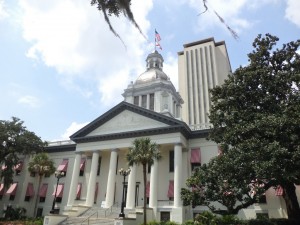 Last week, Florida’s annual 60-day legislative session passed its midpoint. Like in previous years, a lot of key school choice issues remain unresolved with four weeks remaining.
Last week, Florida’s annual 60-day legislative session passed its midpoint. Like in previous years, a lot of key school choice issues remain unresolved with four weeks remaining.
Lawmakers have already agreed to substantially expand educational options for special-needs students, but what will happen with charter school funding, public-school choice, or measures affecting home schoolers?
Here’s a look at where things stand, and what to watch in the final weeks.
Special needs scholarships. A bill expanding Florida’s education savings account program for special needs students, and renaming it the Gardiner Scholarship, has already won approval from Gov. Rick Scott. Other bills (HB 837, SB 1088, SB 1062) have advanced that would expand eligibility for McKay Scholarships, the state’s traditional voucher for special-needs students.
Charter schools. From new standards for charter applications to new rules aimed at encouraging “high-impact” charter networks, a host of changes are rolled into two big packages, HB 7029 and SB 830, both of which have progressed without much controversy.
Charter school facilities. This will be the big charter school-related battle in the session’s final weeks. The House is advancing a measure (HB 873) that would cap school districts’ construction spending and, in some cases, give charter schools access to district property-tax revenue. The Senate has proposed a ban on “private enrichment” from charter school facilities funding and a new formula that would reward charters that serve larger proportions of low-income and special needs students.
Blended learning. A small House bill (HB 4013) that would give schools greater freedom to offer blended-learning courses outside the constraints of a traditional school day is ready for a vote on the floor. A bigger Senate school choice package (SB 830) would make a similar change. Both chambers have also advanced a measure (SB 1714/HB 1365) that would expand competency-based education in select public schools.
Public school choice. Bills that would create near-open enrollment in public schools statewide, giving students greater ability to move across district lines, have advanced in both the House (HB 669) and Senate (SB 886). Students could also have greater freedom of movement under an athletic-transfer bill (SB 684).
Class size. SB 1634 would require school districts to prove their choice programs are truly choice programs, and document how those schools are innovative, to keep their increased flexibility under Florida’s state constitutional limits on class size. It’s cleared two committees, and the question is whether the House will endorse it.
Home schooling. A bill expanding the rights of home education students (HB 835), which would also give them more access to college-level and career-education courses, is ready to be heard on the House floor. Parts of it could be married to a Senate measure (SB 824) that would improve private-school students’ access to dual enrollment courses.
Charters and the constitution. A proposed constitutional amendment creating a statewide charter school authorizer (HB 759/SJR 976) is ready for a vote on the House floor, but has yet to be taken up by the Senate. It’ll be a heavy lift at this point.
City-sponsored charters. A bill allowing cities to sponsor their own charters (SB 808) has cleared one Senate committee, but it has a long way to go and has yet to be heard in the House.
College courses. SB 1076 would overhaul the state’s collegiate high school program, giving public-school students in every district in the state more access to courses at local community colleges. A similar measure doesn’t exist in the House, but this proposal could still be in the mix when issues get resolved in the final weeks of session.
Computer coding. SB 468/HB 887 would encourage the state to promote computer science education. Language explicitly allowing students to use computer programming courses to meet foreign-language requirements has been removed, in favor of a comprehensive study.
Principal autonomy. HB 287/SB 434 would give greater operational freedom to principals in select traditional public schools. The measures have advanced steadily, and the House version could be up for a floor vote as early as this week.
Dyslexia pilot. Measures creating dyslexia-focused schools in select districts around the state (SB 472/HB 377) have not yet been heard, meaning their prospects for this year are in serious doubt.


